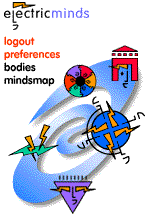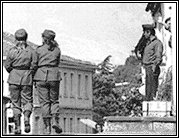
|

|
|
The Long View Back (in the Former Yugoslavia)
peter mathias grunder (ergopublic)Balkanize. 1. to divide (a country, territory, etc.) into small, quarrelsome, ineffectual states. 2. to divide (groups, areas, etc.) into contending and usually ineffectual factions. --Random House Dictionary, 2nd ed. Problems have little to do with place. They have much to do with people. The problems of the former Yugoslavia and throughout the Balkans are problems born of people -- people who have spent far too long in isolation to have an easy time adapting to cooperation. Light is born of darkness and peace is born of war and chaos. Such natural law governs this torn and wounded part of the world. Kosovo is in the south of the former Yugoslavia. There, a silent war continues between Serbs and Muslims; each people has its own language and each looks to its priests for counsel and to learn the will of God. In translation, their words mean the same. As spoken in their native tongues, these words have opposite meanings. You may think that this part of the world is a part of Europe -- it's not. Hong Kong is closer to Paris than to Belgrade; Seattle is closer to Munich than to Sarajevo. You may think that the war has quieted. It hasn't. It goes on. There is no end in sight. Flashback: when World War II was over (does your father remember? Could your grandfather tell you?), the Balkans were down and out. Communism was the only hope; communism was the way. The people of Yugoslavia and Albania didn't care about politics. Most of them couldn't even read. Ideology is something for intellectuals who don't have to work, for politicians who don't care about work, for bosses who give and take work to appease the bestowers of power. Yugoslavians cared about food, about peace, about education for their children, about roads, bridges, and power, and about a government that spoke the local language. Yugoslavia's partisan leader Josip Broz Tito, Albania's leader Enver Hoxha, and their communist henchmen made sure the people got those things. In Albania, they built a Stalinist regime. In Yugoslavia, they built a centralist system with an arbitrary division of the nation into regions. Tito protected minorities by giving them a measure of independence -- and it worked, for as long as the people were focused on repairing the damages of the war. It was an impressive development in Yugoslavia, and it was an even more impressive political slalom that Tito maneuvered between the Soviets and the US. In the fifties, sixties, and seventies, a lot of new nations in Africa, a lot of undeveloped countries suddenly saw themselves in the same boat as Yugoslavia, and hardly anybody noticed that the Yugoslavian system had no sooner formed than it began to break down. The nominally communist system was forced to act capitalistic in order to move into contact with the world's financial markets. Meanwhile, the centralist system began to lose control over the heterogeneous and autonomous regions of the land. The Yugoslavian leaders tried hard to import values from developed to undeveloped regions: Kosovo (along with Bosnia the most undeveloped part of the country) got lots of financial aid. The money for this aid was drawn from more prosperous areas -- Slovenia, Croatia, Serbia. The intention may have been good, but the reality was a disaster. Development plans imposed by officials and intellectuals in Belgrade were accepted by the largely uneducated people out in the regions. But they were never fulfilled. The money and resources got lost in the pockets of those in charge of executing the plans. Nobody much cared about that while memories of the war still lingered in the people's minds. They finally had food; they had schools and governments that spoke their local languages. Freedom of speech and human rights? No one cared about those things. But as the economy grew, as the standard of living rose, people started to think about their situation; about corruption, about the lies behind the plans. The undeveloped regions squandered most of their subsidies, and the richer regions didn't want to support that foolish transfer of money any longer. Belgrade countered the discontent by allowing the regions greater self-administration. During the sixties and early seventies, self-administration was the keyword for Yugoslavia; the slogan carried hopes of a third way, between capitalism and communism. Under self-administration, communist leaders in the regions became little Titos. They took all they could, and the efficiency of the industries showed little or no improvement. Nobody was willing or able to manage an enterprise seriously. Expressions like "return on investment" were unknown -- and unnecessary: when there was a fault, it was Belgrade's fault. When there was a problem, it was Belgrade's problem. (This same pattern of handing off problems repeated itself all across Eastern Europe, and from East Germany to North Korea.) During the seventies and eighties, everybody in Yugoslavia who could, filled their pockets, and the people responsible for perpetuating the corrupt systems became more and more powerful. National unity was maintained only by the army and by the presence of Tito, head and shoulders above the rest, the great leader, the war hero. In people's minds, secession had been a fact long before fighting broke out. After Tito died, the powerful regional leaders broke with the Yugoslavian experiment and became warlords. They still didn't know how to manage their enterprises, but they had good connections and a lot of money. Their thoughts soon turned to finding persuasive arguments for secession. Old issues of ethnicity and religion proved ideal to motivate the population. The result was a cruel war that still doesn't seem to be over. (Another irony of history: in many regions, Yugoslavia is not only destroyed but is also still as undeveloped as it was in the fifties.)
Some people now say that the failure of the Yugoslavian experiment demonstrates the impossibility of developing peaceful solutions in other parts of the world. The truth is that in politics, among uneducated poor
populations, the fate of people is in the hands of their political leaders.
If these leaders are good, with the interests of the people at heart, and
if they indeed have the power to create change, then there is hope. Without
such leadership, and world awareness of the need for it, there is little
hope for the future. And the world had better brace itself for decades more
of civil wars.
That's why this story is not just about former Yugoslavia. It's about us. |
windwalker said: I am once again a very small child exploring the paths through the Montana woods and find a place of total enchantment where there lived a very wise old man who taught me to talk to the fairies on their huge sunflower telephones and walk down a magic path to where the trout filled pond lay glistening in the sun. An old dead tree stump, carved with nitches here and there and a crow's nest sat atop it waiting for its owner to come cawing back, while I, in awe and wonder, saw a Fairy Post Office which held from time to time, a pack of Wrigleys Juicy Fruit gum, a string of pearls or a nail set to fix my nails. How I loved that gentle soul and often wished his tale be told. His name was Hawkins and the place was Absarokee, Montana Most Active Topics: Topic 31 What would you do if you & your love where the last people on the planet??? Topic 8 Who writes poems Topic 53 CHESS | |||
|
| ||||
Also in Flash!: My E-Minds Story Stolen Treasures: New Revisions "Youth, Lightness, and Good Spirits": le Festival du Voyageur | ||||
|
|



